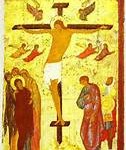It is not so much what he said
but what he didn’t, that mattered most.
I miss certain things, places, and people.
I miss playing football, lacrosse, and lifting weights.
I miss my family when I am not with them.
I miss being with friends.
I miss upstate New York fall colors.
I miss my colleagues from various institutions.
We all miss things, people, places, and times.
Our missing is based on what we know and what we have known. Nostalgia suggests we miss something from the past. We wish for a re-connection because we enjoyed what once was. We reanimate or give new life to ideas which have brought a smile to our face.
 “Missing” means something or someone is left out that should be there.
“Missing” means something or someone is left out that should be there.
I was surprised by what he left out. My friend, who viewed Genesis as figurative and not literal, also rejected the importance of Jesus’ physical crucifixion and His historical resurrection. “What does it matter?” he asked, “If Jesus rose from the dead? It is the hope, the opportunity, the application to change in this life that matters most in those stories.”
It was not so much what he said but what he did not say that mattered most.
“Why should I apply something if there is no thing to apply?” I began. “If the historical or physical reality of a thing, person, or event does not matter, then what does matter? Why should I live a certain way or believe a certain idea?” My friend responded that what mattered most was my present, personal connection to people. But I believe that my care for others is directly linked to the source of care. To me, the origin of something matters most.
My interest in origins drew me to Franklin Freeman’s article, “A Christian Reflection on the Attractions & Shortcomings of Buddhism” in Touchstone magazine. As a past follower of the Eastern viewpoint, Freeman’s insights bear weight. What struck me most in his reflection was what Buddhism misses:
What Buddhism doesn’t tell us is why we are here, where human beings come from, and why are we different from the rest of nature. It asks us, instead, to forget we are human and to seek to realize that we are, in fact, one with the with the wind or falling leaf. . . . But, we stick out, so to speak, from nature like a sore thumb. [1]
Why should we care about the creation or people or anything? Freeman explains that what Buddhism misses most is an emphasis on history.
We all need the love of the God-Man, Jesus, who revealed himself in history by pitching his tent with us. Here again, Buddhism excludes something, and that is history. Nowhere have I read a Buddhist writer grappling with Jesus’ claims to divinity or with the historical claims of the Church. [2]
People care about what happens in real space and time to real people.
 Christianity depends on history for its truthfulness. If Jesus did not come to earth as a real human person, in real time, in a real place, then Christianity has no premise and no promise.
Christianity depends on history for its truthfulness. If Jesus did not come to earth as a real human person, in real time, in a real place, then Christianity has no premise and no promise.
But it gets worse. If there is no premise or promise for anything then there is no reason to care for anyone. My care must connect to something which already occurred, someone about whom I care. I am missing what has come before. My nostalgia, my missing, has its origins with The One who made me, The One who placed this longing in my spirit, The One Who started it all:
God has placed eternity in man’s heart . . . whatever God does endures forever; nothing can be added to it nor nothing taken from it. God has done it so that people fear before Him (Ecclesiastes 3:11, 14).
What we know is based on Who has first known us.
Mark believes that “we love Him because He first loved us” (1 John 4.19) is the basis for all “missing.” We are nostalgic for what what was and what will be again. Dr. Mark Eckel teaches the doctrine of “missing” in all his teaching, wherever he travels, but specifically for Capital Bible Seminary.
[1] Franklin Freeman, “The Door to Paradise: A Christian Reflection on the Attractions & Shortcomings of Buddhism,” Touchstone, July/August 2013, 45.
[2] Ibid., 46.



Keep saying it brother. We are on the same page. It is a delight to hear folk speaking as if the Word is of value Historically and so the basis of all else. If it isn’t – why bother with any of it. If Genesis is figurative, we have no need of Redemption as there is no such thing as sin.
It is good to see you are still engaging our culture about the things that matter most.